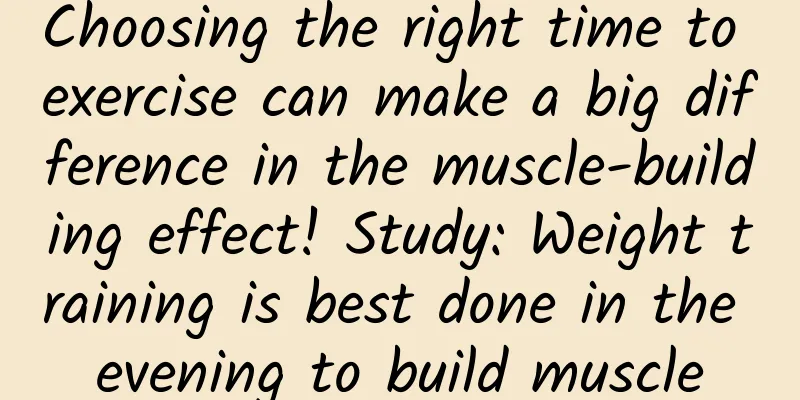Choosing the right time to exercise can make a big difference in the muscle-building effect! Study: Weight training is best done in the evening to build muscle

|
Scientists have found that high-intensity exercise or weight training in the evening leads to better performance; as for moderate and low-intensity aerobic exercise, the correlation between it and the biological clock is less significant. Normally we rely on watches to tell time, but there is actually a biological clock in the brain that records the day and night cycle. In order to study the consequences of humans losing their sense of day and night in space, a French scientist lived in a pitch-dark underground cave for 62 days in 1962. He did not bring a watch or any timing device, and people on the ground could not contact him. Every day when he gets up, eats, and goes to bed, he will signal the ground personnel to record his work and rest time to see what people's work and rest time will be like in an environment where they lose their sense of time. Every day he sleeps when he is sleepy and eats when he is hungry. Although he never saw the sun and had no way of knowing the time, his daily routine actually maintained a 24-hour and 30-minute day and night cycle. This proves that there is a biological clock in the human body that is continuously running. This clock not only controls our work and rest cycles, but also controls our endocrine system, body temperature, appetite, and athletic performance. Scholars studying sports science then wondered whether athletic performance would change with the biological clock? Can we coordinate with our biological clock to achieve the best training results? The answer is: Yes, you can! It’s best to exercise and build muscle in the evening! Scientists have found that explosive, strength, anaerobic exercise, such as weight training, is best performed between 4 and 8 p.m., while 6 to 10 a.m. is the worst time for strength training. According to data from different studies, the difference in exercise performance between the morning and evening ranges from 3 to 21%. In other words, muscle strength in the evening may be 3 to 21% higher than in the morning. A 2009 study even found that weight training in the evening resulted in 0.8% more hypertrophy than training in the morning (but not statistically significant). (Photo provided by Sancai Culture) Scientists don't fully understand why this phenomenon occurs, though some speculate that it may be caused by changes in body temperature, while others believe it may be caused by changes in the ability of nerves to recruit neurons. In short, the reasons need further research and exploration. Relatively speaking, low- and moderate-intensity aerobic exercise is less affected by the day-night cycle. Some people like to run or swim in the morning, while others like to go to the gym to ride a flywheel after dinner and before going to bed. Regardless of the type of aerobic exercise, exercise performance has nothing to do with the biological clock. There is basically no difference between running in the morning or in the evening. Although high-intensity exercise or weight training is better in the evening, those who are used to exercising in the morning should not worry too much. Research shows that the body adapts to specific training sessions. In other words, people who are used to exercising in the morning will actually be stronger in the morning than in the afternoon. For those who are used to training in the evening, the strength gap between the morning and evening will be further widened. Exercise pyramid, customize the exercise mode that suits your habits Having said that, no matter how good the exercise plan is or how ideal the exercise time is, it will be useless if it is not executed continuously. Consistency is the basis of exercise habits. Modern people lead busy lives, working, going to school, taking care of children, submitting reports, and meeting deadlines. It is difficult to squeeze out time for exercise. Apart from professional athletes, few people have the flexibility to decide whether to exercise in the morning or evening. Although exercising at a fixed time or doing weight training in the evening can give you a slight advantage, I think it is a long-term strategy for most people to choose the most convenient, practical and feasible time to exercise. The exercise time pyramid is arranged from bottom to top according to importance. The first level of the pyramid is to arrange training according to personal time permit/preference, the second level is to train at a fixed time every day, and the third level is high-intensity exercise in the evening. (Photo provided by Sancai Culture) Exercise is a lifelong thing. The first priority for beginners is to establish a habit and not give up halfway. So there is no pressure. The time you can exercise well is good time. For those who have more flexible time, it may be better to do weight training in the afternoon. Aerobic exercisers don’t have to worry about this, as it’s good to exercise at any time. As for friends who often ask, will doing weight training at night affect sleep? A meta-analysis published in the journal Sports Medicine in 2018 found that exercising at night does not interfere with sleep and may even improve sleep quality! Research on weight training has also found that whether you do weight training in the morning, afternoon, or evening, it has a positive effect on sleep and is better than not doing it at all. However, there is little research to support the idea that very high-intensity exercise, or exercise done within an hour before bedtime, should be considered. For friends who already have insomnia problems, to be on the safe side, it is best not to do high-intensity exercise within one hour before going to bed. For those who don’t have insomnia problems, please feel free to exercise. Dr. Scott's 1-minute reminder Training times are based on personal preference first, followed by a fixed training time, and finally weight training in the evening. Exercising at night will not actually prevent you from falling asleep. For modern people who are pressed for time, it is possible to exercise at night. This article is selected from Sancai Culture's "One-Minute Weight Loss Classroom 2 Dr. Scott's Scientific Guide to Muscle Gain and Fat Loss: The Latest Scientific Research X Seconds to Understand Chart Analysis, Debunking 41 Weight Loss Myths! 》 |
Recommend
Eating probiotics can help you lose weight easily! Red wine and olive oil are available
If you want to lose weight, do you have to be too...
What should I do about malignant uterine fibroids? What are the symptoms of malignant uterine fibroids?
Uterine fibroids are a common disease in women. M...
Be careful when having an abortion, as repeated miscarriages can easily lead to gynecological diseases
There are many complications of abortion. Apart f...
A 50-year-old woman is feeling uncomfortable during menopause. The doctor teaches you three ways to help you get through it safely.
Aunt Li, a lively lady who is about to celebrate ...
Are you full or greedy? 4 tips to deal with "false hunger"! Gao Minmin: Don’t step on landmines when eating like this
After the New Year, you should also focus on cont...
Can I use Fuyangjie to wash my private parts? It depends on the specific situation.
Whether you can use Fuyanjie to clean depends on ...
Drink 3 spoons of brown sugar banana vinegar a day to lose 8 kg a month
Banana milk, banana ice, banana cake, chocolate b...
How to diagnose ovulation bleeding
What are the methods for checking and diagnosing ...
High-risk groups for ectopic pregnancy: 6 types of women need special attention, and the last one must be seen by your husband!
Ectopic pregnancy, this scary-sounding medical te...
How to treat menstruation after abortion for one month? 7 dietary treatments for menstruation after abortion
One month after an abortion without menstruation ...
What are the causes of acute cervicitis?
Cervicitis is a common gynecological disease, but...
Does physical therapy for severe cervical erosion affect fertility?
Does physical therapy for severe cervical erosion...
Kate Middleton is so slim after giving birth. Dukan's weight loss is amazing
The British royal family's Princess Kate gave...
How to prevent pregnancy with adenomyosis
Adenomyosis, also known as adenomyosis, mainly oc...
3 Medicinal diet improves anemia symptoms in patients with uterine fibroids
Uterine fibroids can cause irregular menstruation...









